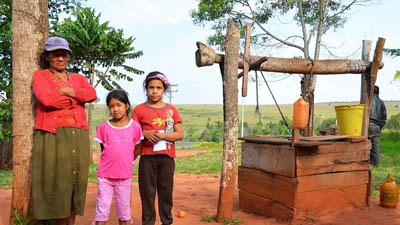Secundino Vera remembers that until a couple of years ago he used to walk with his family a few kilometers and get to the Say’ju stream to bathe and even to get water from its source. Today, his greatest concern is to make sure that his grandchildren do not get close to the stream. And why is that? Its water is contaminated mainly as a result of the spraying of crops that grow close to the community, and it is no longer a safe source of water.
Vera is the president of the Association of Indigenous Communities of San Pedro (ACISPE) and one of the leaders of the community of Santa Isabel Yasy, an indigenous ava guaraní community established in the department of San Pedro, at about 300 km. of the capital city, Asunción. In this community, 151 families have organized themselves to carry out a Community Investment Plan with the support of the Ministry of Agriculture and Livestock, through the Sustainable Rural Development project which has financial and technical assistance from the World Bank.
Secundino’s community will have access to an investment fund of USD 40.000 that will be used to improve the system that supplies and distributes drinking water.

